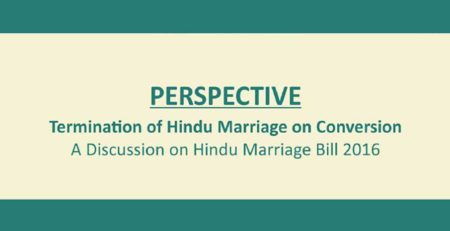Women’s Right to Divorce
Latest IPS brief analyzing the recent recommendations of Council of Islamic Ideology.
Introduction: Recommendations of the Council of Islamic Ideology (CII) presented after its 171st meeting constituted the headlines of national newspapers on November 16 and gave birth to heated discussion in the length and breadth of the country. While one section of the society rejected these recommendations[1] and demanded dissolution and reconstitution of the Council[2], other termed them as ‘historic[3]’ and ‘a cause to celebrate[4]’. This controversy called for an objective and impartial analysis of the question under debate to pave the way for a healthy and fruitful discussion on issues which have, undoubtedly been haunting the hearts and minds of many in this society.
Concerns over these recommendations were also expressed in the National Assembly where Minister for Parliamentary Affairs Babar Awan and Minister for Religious Affairs Hamid Saeed Kazmi assured the House that no legislation contrary to Islam would be initiated and that the recommendations of the Council shall not be legislated upon in their present form. Mr. Kazmi noted that the council now had only eight members compared to a full strength of 20 and said the recommendation would be sent back to the council when it attained its full strength[5].
To grasp the full picture, we shall have to understand the Council itself, its functions and duties and then look into its recent recommendations and understand the whole debate.
The Council: Council of Islamic Ideology (CII) is a constitutional body and functions under the mandate of Articles 228-231 of the Constitution of Islamic Republic of Pakistan. It consists of such members, being not less than eight and not more than twenty as the president may appoint. Constitution requires the president to ensure that various schools of thought and different sections of society are represented in the Council so far as practicable. CII is responsible for making recommendations to the federal and provincial governments and legislature as to the ways and means of enabling and encouraging the Muslims of Pakistan to order their lives individually and collectively in all respects in accordance with the principles and concepts of Islam as enunciated in the Holy Qur’anSunnah. It is also required to make recommendations as to the measures for bringing existing laws into conformity with the Injunctions of Islam and the stages by which such measures should be brought into effect. and
Recent recommendations have touched upon wide range of subjects including certain sensitive issues of Muslim personal law as well as those which might have national and even international implications. These recommendations had however been reported summarily and had therefore led to a number of questions and confusions. When the Council was approached for its detailed version, it was informed that no report, working paper or even brief of the discussion was available in this connection.
Recent Recommendations: Following are the recommendations of the Council made in its 171st session and released to the media: (Translated from Urdu)[6]
1- “It may be legislated that husband shall be obliged to divorce his wife within ninety days if she so demands in written and if he abstains then divorce shall become effective on expiry of ninety days period except where wife revokes her demand. The husband shall, in that case, not have the right to revert to her. Wife shall, then, have to return any moveable or immoveable properties given to her by the husband in addition to dower and maintenance or refer the matter to the Court in case of dispute.
2- Council has approved certain amendments in the Nikah form and has suggested Talaq form on the same format and it has been recommended that Talaq too be registered like Nikah.
3- After considering the issue of moon sighting, Council has decided to prepare a Hijri calendar for the whole world, solely based on scientific findings and considering Makkah as the Centre. All religious days and rituals then be celebrated in accordance with this calendar.
4- Council has also decided to prepare a special report in view of spreading menace of extremism and terrorism and thereby present its recommendations to the government for coping with terrorism. Council has also considered the options to be followed by the common persons in response to terrorist activities.
5- Concerning traveling of a woman without accompanying closely-related male (mehram), the Council has found that under Constitution of Pakistan and national laws women can freely travel within country and even abroad. There is no restraint over them. Saudi laws do not come in the jurisdiction of the Council.
6- Council has also devised guiding principles for enforcement of Shari’ah which will be laid before religious scholars in the upcoming seminars of the Council on enforcement of Shari’ah.
7- In its 171st session, Council has also recommended legislation for maintenance of needy and poor relatives and has approved a draft as well.”
Implications: While each of the recommendations demands for independent discussion, it should however be appreciated that the issues brought to light by the Council are already debated on various levels and they in fact ask for attention of policy makers and thinkers. While these recommendations cannot be discussed in detail on account of lack of their underlying ideas and arguments, it can, however, be pointed out that brevity of these proposals has caused confusion and perplexity. Recommendations by a Constitutional body, which, if accepted, will impact millions of people, needed to be presented in a way that was less likely to leave any room for presumption and speculations.
Rare, if any, criticism or objection has been seen to second, fourth, sixth and seventh recommendation and these have been generally accepted rather welcomed in principle. Third one has been objected upon on technical as well as religious grounds.[7]. Fifth recommendation has also been contested by religious scholars on the basis of certain authorities narrated from the Prophet[8] but what seems more surprising is the fact that CII has not examined the issue in question on the basis of Shari’ah. It has, on the contrary, opted to state the current legal position, while interpretation of law is not the prerogative of the Council.
Real controversy sparked on the first recommendation. It not only relates to Muslim personal law but also has a connection with worldwide debate on ‘rights’ of women. This connection has made the debate even more intense, rather fiery and resultantly the objectivity and just approach appear to have lost somewhere.
Though it is not yet clear what may be the practical shape of this recommendation yet viewing plainly at the implications of present proposal of CII, it is evident that adopting it would deny the exclusivity of the right of divorce available to the husband and it would virtually undo the institution of Khula’. It may be mentioned here that in case of khula’ through Court, the right of spouses to reunite through remarriage still remains available.
This may be highlighted that Islam has devised complete mechanism for solving disputes which may jeopardize matrimonial relationship. It cites simile of dress to depict the mutual protection, closeness and warmth in the relationship of husband and wife[9] and illuminates that marriage is source of love and compassion and a source for finding rest in each other[10]. If, however, a conflict arises between the spouses which they could not solve mutually then the family should involve itself and one judge from each side be nominated to resolve the issue[11]. Owing to the nature of Muslim society this is more likely to end into a peaceful and satisfying compromise. In case this too does not work then several modes have been made available to the couple and any of them can be opted according to the circumstances. Wedlock may be dissolved through mutual consent of spouses (Mubar’at) or female can surrender some of her rights (normally such amount of money or belongings which husband had given her under various heads)[12] to acquit herself from the agreement of marriage (Khula’). Khula (lit. to doff) can also be obtained through court if the couple is unable to reach an agreeable arrangement. According to the current legal system, if a female approaches Family Court for Khula then Family Courts are bound to dispose of the cases within six months from the date of their institution under Section 12-A of West Pakistan Family Courts Act, 1964. Wife can also get her marriage dissolved through intervention of court in certain other conditions which may hinder smooth family life and are enlisted in Sec. 2 of The Dissolution of Muslim Marriages Act, 1939. In another situation she can even divorce herself if the right of divorce has been delegated to her by husband[13]. This delegation in itself, however, does not constitute divorce[14].
In the social setup established by Islam, man has been given administrative responsibilities over women[15] and in case of a conflict or disagreement the right of divorce rests with the husband. Certain limitations and restrictions have, however, been imposed on its practice to ensure that this right is not used abruptly and to sheer disadvantage of any of the parties. Divorce is effective only when pronounced thrice but pronouncing talaq thrice simultaneously or during menstrual period of wife is strongly detested. It has been advised that one talaq should be pronounced in one sitting during days of her purification and spouses should not separate from each other lest a chance of understanding each other and reunification is lost. Separation and dissolution of marriage should take place only when it is clearly inevitable[16].
This should however be clarified that even a talaq pronounced thrice or more in one sitting, though disliked, is deemed effective in the opinion of majority scholars in Pakistan. No chance of reunion remains available in this case. It is, therefore, feared that if pronouncing Talaq is made obligatory on the husband, on the written demand of wife then according to ordinary, though wrong, practice of the society all three talaqs will be pronounced simultaneously and option of reunion without intervening marriage will not remain available to them.
Above discussion indicates that there are certainly a number of questions as to whether this recommendation of CII is a step forward towards integrating public belief and the law or it is contrary. Apparently the purpose behind this recommendation is redressing the grievances of those women in the society who are languishing in their own homes without enjoying the rights and privileges originally assigned to them by Islamic Shari’ah and who have no way out of this pity situation either on account of social behaviors based on ignorance or the defective judicial system. It goes without saying that these problems of society need to be addressed properly. Yet abrupt deviation from the common beliefs and set practices shall not serve the purpose. It would, on the contrary, adversely affect the integrity of a state institution like CII and widen the gap between various sections of society. Similarly maintaining the status quo on issues of common concern will also increase anger and dissatisfaction. At the very outset, it must be acknowledged by all sections of society that there are certain severe problems in the society caused by unjustified use of rights and privileges and the mechanism for checking this misuse is both flawed and ineffective.
Ways will have to be considered to reform the situation but they must remain within the ambit of Shari’ah, if they are really meant to be translated into practice. It is therefore advisable that mechanism of dispute resolution through intervention of family be given a proper shape and pronouncing talaq inconsistent with that laid down in Shariah be held punishable. It has also been a long standing demand of various sections of society that specialized Family Courts, separate from Civil Courts and in separate premises, be established to avoid any possible delays and to provide a more secure and respectable environment to women. It has also been demanded time and again that number of family courts be increased with an increased number of female judges.
Ongoing debate in the print and electronic media and on public and private fora has also made it clear that majority in the society are unanimous that no law in the country is desirable in derogation of the injunctions of the Qur’an and Sunnah. It is also stressed that only competent scholars and specialists of Islamic knowledge should interpret the teachings of Islam. But they must have the assistance of experts of modern knowledge to devise their practical implementation. It must also be emphasized that prior to recommending any major change in sensitive issues, all stakeholders need to be consulted and taken into confidence. Above all, statements and recommendations which may cause a reaction must carry a reasonable degree of certainty and clarity. Impulsive reaction, which might exterminate even the positive aspects of a suggestion, should also be avoided.
[1] Daily Jang, Rawalpindi, Nov. 17, 2008
[2] Daily Jang, Rawalpindi, Nov. 20, 2008
[3] Daily Times, Nov. 17, 2008
[4] The Nation, Nov. 17, 2008
[5] Daily Dawn, Nov. 19, 2008 and other national dailies of the day
[6] http://www.cii.gov.pk/recomm/ciirecom201108.asp accessed on Dec. 13, 2008
[7] Primary objection is that according to a number of famously known traditions of Holy Prophet, Muslims are obliged to consider start of a new lunar month after actually seeing the new moon and this has been ordained to inhabitants of each area separately because of the natural difference in the time across the globe See e.g. Sunan Abi Dawood, 4332; Sahih Muslim 2391
[8] See e.g. Sahih Bukhari, 1088
[9] Al-Qur’an 2:187
[10] Al-Qur’an 30:21
[11] Al-Qur’an 4:35
[12] See e.g. Sahih Bukhari, 197, 198; and PLD 1964 SC 456
[13] Muslim Family Laws Ordinance 1961, Sec. 8
[14] See e.g. Sahih Bukhari 188
[15] Al-Qur’an 4:34; 2:228; Haskafi, Al-Durrul Mukhtar, Chapter of Khula’, vol. 2, P. 769
[16] For detailed discussion please see Shagufta Omar, Dissolution of Marriage: Practices, Laws and Islamic Teachings, Policy Perspectives, vol. 4, Jan-Jun 2007, Institute of Policy Studies, Islamabad.






